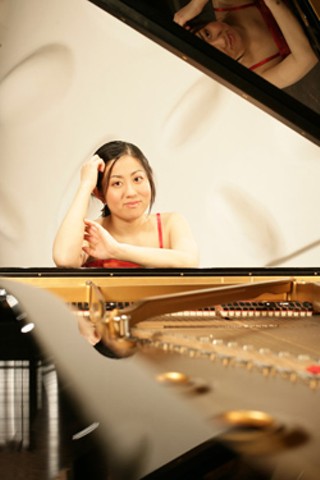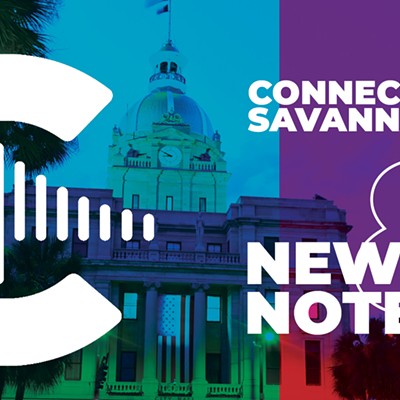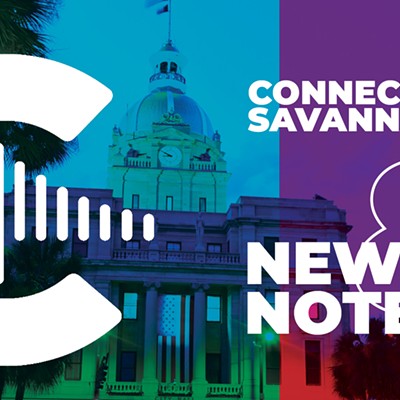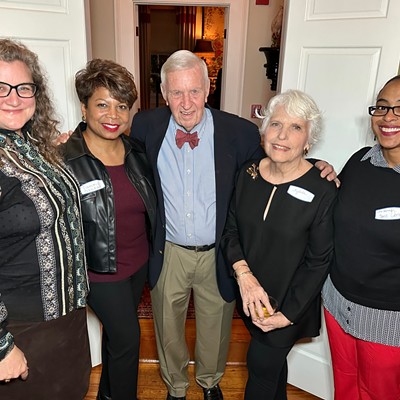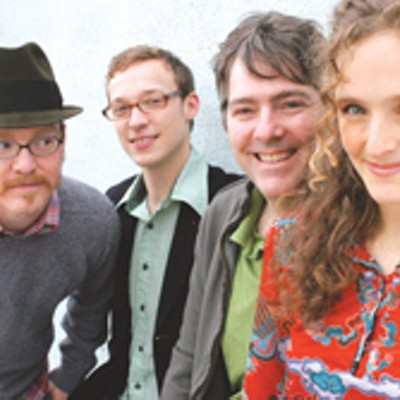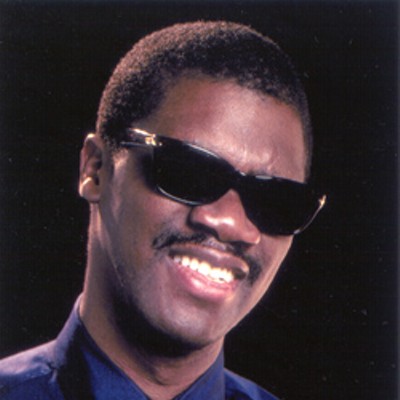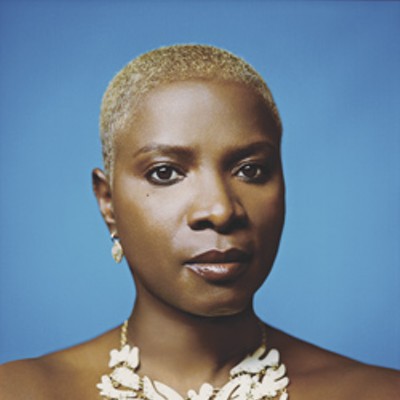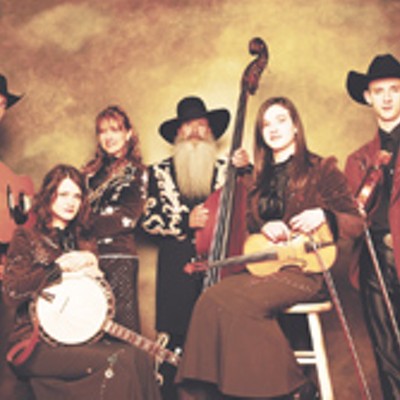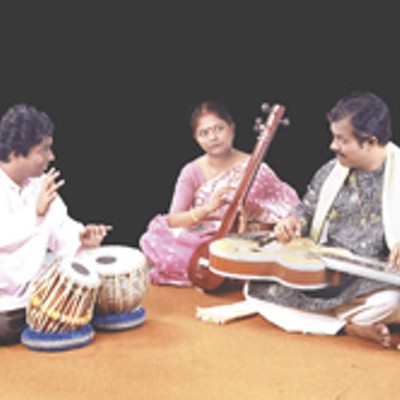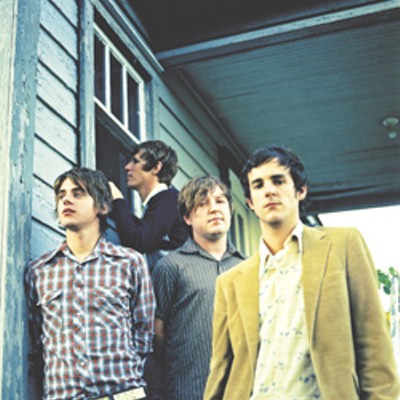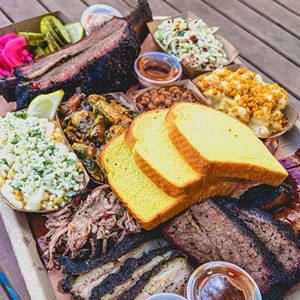THE PHENOMENAL, AWARD-WINNING, TOKYO-BORN Yu Kosuge gave her first piano recitals at the tender age of nine, and by ten was studying under some of the finest instructors in Germany and Austria.
Lauded for her gentle touch on the keys, her pianissimo technique was described by one effusive critic as “the moment when the tip of an angel’s wing touches one’s cheek,” she has found international fame through consistently dazzling performances. Her tours take her to concert halls and major classical festivals throughout Europe, Japan, Russia and the USA, and she has released nine CDs, many on the prestigious Sony imprint.
As if that weren’t enough, the charming musician is also a successful author, having published a humorous, self-effacing memoir in late 2005. We spoke just a few days before she was set to leave Japan for a ten-day U.S. tour that stops at our own Savannah Music Festival.
You’ve been playing piano in public since age nine. I’m always curious to learn if professional musicians who got their start at a very early age feel any remorse or regret at spending all those hours on rehearsal during their childhood. Are you at all concerned that such dedication to your craft as a young girl caused you to miss out on important experiences other women your age enjoyed?
Yu Kosuge: Oh, my goodness. People tend to think that those like me who started their career early, grew up in a white capsule with nothing but a black piano and practiced 24 hours a day! We do experience puberty, hanging out with friends or having fights, too. I attended very normal primary and high schools, which didn’t specialize in music at all. I think it was very good to know people with other interests. At age nine or ten, I was so into soccer that it occupied most of my thoughts, and I also wanted to be an astronaut. Travelling and adventure were always my things! Of course, I missed a lot of classes for my concerts, but I don’t feel I missed out on (many) experiences. I am very thankful I started very early, because performing on stage isn’t at all an easy thing psychologically. Experience is everything!
Did you choose the piano for yourself or did your parents initially choose it for you?
Yu Kosuge: I was an inquisitive kid who wanted to get her hands on everything. I didn’t have a particular interest in piano at first. Mostly, I liked to listen to orchestras and those pieces where I could imagine things as a child —like Peter and The Wolf or Peer Gynt— are those which I listened to again and again. I still remember those LPs my parents had at home, which I pulled out. I enjoyed putting the small needle on the vinyl. I liked composing, too. My mum taught piano at home, and I was very keen to get as much attention as her pupils. I think that is why I first asked her to teach me too. I gradually found out that the piano was a lot of fun.
Have you ever seriously attempted to learn any other instruments? If so, which ones, and what do you like about them as opposed to the piano?
Yu Kosuge: No, but I have always had soft spots for stringed instruments — at first, even more than the piano. It’s difficult to let the piano “sing”, and I miss the phrasing or vibrato you can do on a stringed instrument.
You left your native country to study abroad in Europe at the age of ten. Was that a difficult transition to make at such a young age?
Yu Kosuge: I went to Germany for the first time at age nine to perform at a young artists’ concert, which lead to couple of exchange concerts with German artists of my age. I started to do chamber music and made friends, so the change of culture or the difficulties of being in such a different environment didn’t occur to me. When a professor invited me to come to Germany to study with him, I really was like,“Pleeeeease, I wanna go there!” But after moving there, it wasn’t easy at all.
First of all, there’s the language, of course. To join a completely German school meant feeling very alone at times. Making friends meant a lot of fighting to get people juss to understand me, and as the good, shy Japanese girl I was at that time, (but obviously not any more!) it took quite a while.
The best help I had in getting away from those everyday problems was music. Music was the thing I could hang onto. I don’t believe in the cliché that says Japanese people don’t support each other’s personalities and instead educate just in technique, because I received an excellent education there. But a lot of my ideas and questions felt out of the ordinary. I think I had a wall in front of me, which I broke through gradually when I came to Europe, because I understood there that it’s okay to express my emotions or my thoughts.
Asking a lot of questions, I felt the freedom I always wanted to have. And those things I did in my early age, such as questioning myself as to what I really wanted to do with each piece, what this music is about and what kind of feeling I wanted to express, helped me to grow my personality. Those musical experiences came together in my adolescence. I finally felt it was okay to be as I am.
Did any of your family travel with you, or were you essentially on your own with only teachers and advisors?
Yu Kosuge: I was ten, and my parents didn’t want me to be completely alone in another world (laughs). So, my mum went with me for a while.Critics have praised your light and gentle touch on the keys. Is that something that comes naturally to you, or have you made a specific effort to emphasize a wide dynamic range in your playing?
Yu Kosuge: I do think a lot about my touch. I want to create many additional ranges even between piano and pianissimo. And in pianissimo itself, there are millions of colors you can create. The interesting thing about the piano is the ability to create an orchestra with it, by imitating a bassoon or horn or a church bell. The possibility is immense. And you also have to control the speed of the hammer hitting the string! I mostly start my day by practicing Bach or Mozart, which helps me to keep sensibly in touch without using any pedals.
You have achieved widespread acclaim without winning any major piano competitions, which seems to be quite unusual in your field. Have you merely avoided competitions, or have you competed actively, but simply not won any major awards?
Yu Kosuge: I won some national competitions as a teenager, but that was all. I had the luck to get to record my first CD at age 12, and make my first public recording when I was 15. People started to talk and hear about me, and soon after that, I also got an agent. So, I didn’t really consider doing competitions. This all came quite naturally. While I know that winning competitions can help one’s career, on a personal level, do you seek to receive the type of peer and critical admiration that comes from such awards?
Yu Kosuge: I got to learn often that it’s no good to worry about what others think about you. My goal lies somewhere else entirely. I don’t want to be an artist who only wants to give comforts and joy with their music. I think music must move and change people. For example, when I play Beethoven’s Appasionata, I want people to feel the pain and desperation of the piece. And, even if I don’t have any competition awards to show, am I not still on the scene? It is much more important for me to grow and still be playing when I am 50 or 60 than to have a big career break.
You travel extensively and perform all around the world. Is it difficult to maintain relationships with family, friends and loved ones when touring internationally? If so, what do you do to try and remain close with such people while you’re on the road?
Yu Kosuge: Thank God, we have Skype and Facebook! (laughs) Isn’t it difficult anyway to maintain relationships with people? But as much as I love these tools, I of course try to make personal contact as much as possible. I’m not lazy when it comes to travel, so I go visit as soon as I have time. It’s the same way when I want to listen to a particular concert.
You’ve released close to ten albums, and have a long association with Sony Records. In the USA, we constantly hear about how the record industry on the whole is dwindling, and even talented artists in the pop world are having a hard time selling any albums. Yet, in the classical world, top musicians or soloists only sell a tiny fraction of the number of albums that pop stars do. How has the changing landscape of the music business (and the advent of MP3 file sharing) impacted the classical music world, if at all?
Yu Kosuge: I think you cannot avoid the evolution of technology, but the difference in quality between the sound of MP3s compared to CDs is big. And it is also a shame when people only listen to music at home in front of their computer. Something we musicians have to fight for to make sure people still come to concerts. I mean, don’t you agree that live concerts are exceptional experiences?
Certainly! What specific pianists do you listen to avidly for pleasure and inspiration?
Yu Kosuge: My favorite pianists are mostly dead. What a shame. I love Arthur Schnabel for his natural musicality, and Claudio Arrau for his sound and range. Of the few living pianists I love, there is Richard Goode. He always has a very warm sound and it feels as if he is playing chamber music.
If you were not a professional musician, what would you most likely be doing for a career?
Yu Kosuge: I always wanted to do the make-up for zombie movies. Besides classical music, do you also enjoy other types of music, and if so, what would they be? Do you have any favorites styles of music which some might find surprising, given your classical background?
Yu Kosuge: I love to dance, I take Salsa lessons. So, I love Salsa music, and also Tango. I could listen to (Tango pioneer Astor) Piazzolla all day long. I sometimes listen to hip-hop. Xzibit’s my favorite hip-hop artist.
For this performance, you’ll be playing the following works: Haydn’s Fantasia, Beethoven’s Fantasie Op.77, Schubert’s Grazer Fantasie D 605A, Chopin’s Fantasie op. 49, De Falla’s Fantasia Baetica and Liszt’s Sonate h-moll. Which one is the most challenging to perform and why?
Yu Kosuge: Every piece is challenging in its own way, but Liszt’s h-moll Sonata would be the center of the program. I think its originality and range full of emotions makes it an exception amongst his works. This piece is absolute music and has nothing to do with virtuosity. It is a challenge to control this huge form and work out its complex themes. I also want to mention Haydn’s Fantasia, which he composed while in a good mood. It is full of surprises and humor. In Schubert’s Grazer Fantasie, which is rarely played, you can find his typical lyricism and beautiful harmony changes, combined with dances.
Are any of these new pieces which you have never played in public before, or are you very familiar with them all?
Yu Kosuge: I toured Japan in March with the same program.How do you go about choosing which works you’d like to try and learn?
Yu Kosuge: I try to play pieces which go with my age. Pieces like the last Beethoven Sonatas or Brahms’ Concerto I learn of course, but do not play in public because those pieces are very mature. And also, I make sure to learn the whole cycle, and never just one piece of it, because it’s important to think of it as whole to better understand each piece. I always had this “Christmas goal”: I work on a big piece like all the Chopin Preludes or all the French Suites until Christmas, and then play them in front of friends or a mentor on Christmas Eve night. This year, I want to work a lot on Schubert. This means studying about his life — not only his piano work, but his chamber music as well.Before you agreed to come and play in the Savannah Music Festival, were you familiar at all with either this festival or our city?
Yu Kosuge: It’s my first time, and I’m totally excited about it!How long will you be in the USA on this trip?
Yu Kosuge: I will going to play in New York, so I’ll stay something like ten days.What’s the most memorable or interesting thing you’ve done on prior visits to our country?
Yu Kosuge: A good friend of mine, a cellist and conductor, was at the Mayo clinic for cancer treatment. I went there to visit him after in 2005 after my recital at Carnegie Hall. They had three or four excellent grand pianos in the lobbies, and I played on every one of them. I particularly remember the moment when he and many of the other patients came downstairs to listen to me. They wanted to hear more and more. I played Chopin’s Nocturne, and I could see my friend’s tears.
He was a very bright person and he didn’t lose hope until the end, but I realized how much he really suffered. It was the last time I saw and could play for him. It wasn’t a concert but at moments like those it becomes clear that it is so important to share our love for music, and how beautiful what we do actually is.
Is there any one thing in particular which we sell over here that is hard to find in Japan, which you always stock up on when visiting the USA?
Yu Kosuge: I’m a movie freak. I must watch 100 movies a year. So, I’m definitely going to search for DVDs I can’t get here in Europe, like special Director’s Cuts and such.
One last question: I am a big fan of an old Japanese TV program from the late 1960s called Ambassador Magma (or Magma Taishi), which dealt with a family of robots that defended Earth against an alien villain from outer space named Goa. Most people in the USA have never heard of this TV show, and whenever I meet someone from Japan, I make sure to ask them if they have ever heard of or seen it. Are you familiar with it, and if so, are you a fan of the show?
Yu Kosuge: It sounds like a science fiction show that I would love too! But no, I am not familiar with it.
Yu Kosuge
Where: Telfair Academy of Arts & Sciences
When: 6 pm, Fri., April 4
Cost: $50 at www.savannahmusicfestival.org or 525-5050
Info: www.yu-kosuge.com

